Posts feature partner companies & may be sponsored. Post contains affiliate links & I will be compensated if you make a purchase after clicking on links. As an Amazon Associate I earn from qualifying purchases.
Last Updated on April 23, 2023 by Diane Hoffmaster
Gardening is a lot of fun and a great way to reduce your carbon footprint. It gets us out into the sun, gives us a way to get some exercise, and provides us with food for our kitchen table. However, it isn't always cheap! I am going to share a ton of upcycling ideas for frugal gardening that will help you grow food on a budget.
There are so many things that we HAVE to spend money on when we start gardening that it is always nice to find a way to cut costs in the garden when we can. Learning to upcycle things from our home for use in the garden is a great way to save money without sacrificing the harvest.
From attending a seed swap to extending the gardening season with a DIY greenhouse, these frugal gardening tips will let you flex your green thumb and stay within budget!
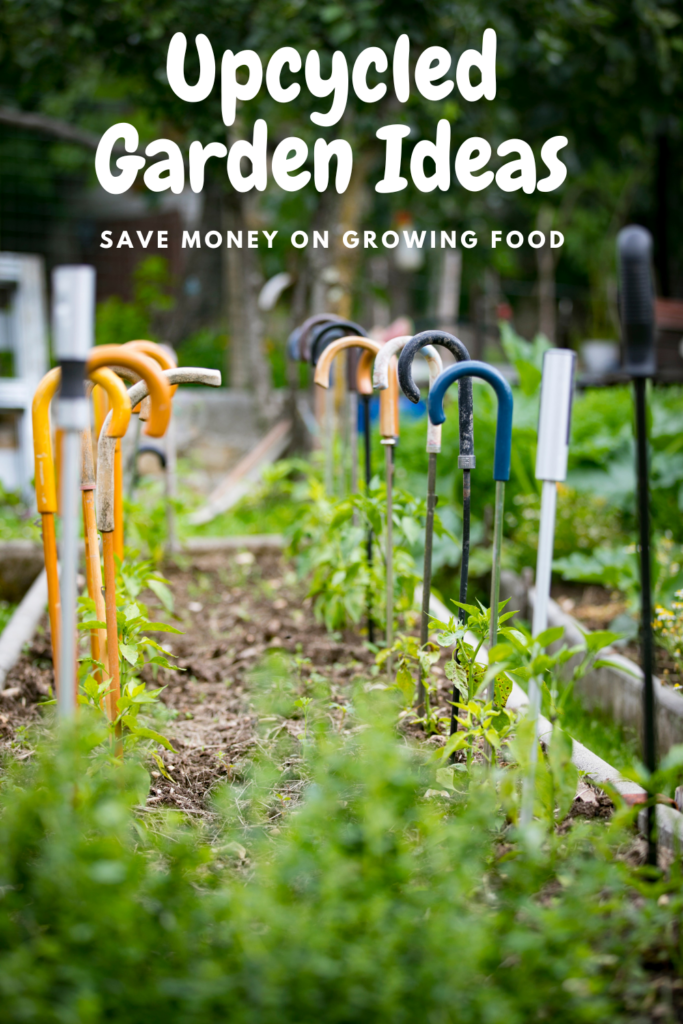
Table of Contents
Top Tips for a Frugal Garden
Before I get into my upcycled garden ideas, I am going to share my top ten tips for a frugal garden. There is no reason to go broke trying to grow your own food.
Start small
Start with a small area and expand as you are able. Don't overextend yourself or you risk wasting money on things you can't or won't take care of. The frugal gardener doesn't let things go to waste, however, there is only so much time and energy to maintain your garden.
Grow from seeds, not seedling starts
If you are a beginner, starting with seedling starts can be helpful. However, if you have the time and patience, growing from seeds is much more economical. If you do start from seed, read the back of the packages so you know exactly when and how to grow them.
Ask friends for cuttings
If you have a friend or neighbor who is already gardening, ask them for cuttings or divisions. Many perennial vegetables and herbs can be propagated this way, so consider asking your green-thumbed pals if they'd be willing to share. You may have to invest in some rooting hormone to encourage them to thrive but it will save money in the long run.
When I started gardening, I didn't have many friends who were interested in it. Now it seems like everyone I know is starting plants to put in their raised bed! With the cost of groceries nowadays, everyone wants to save money and grow their own food.
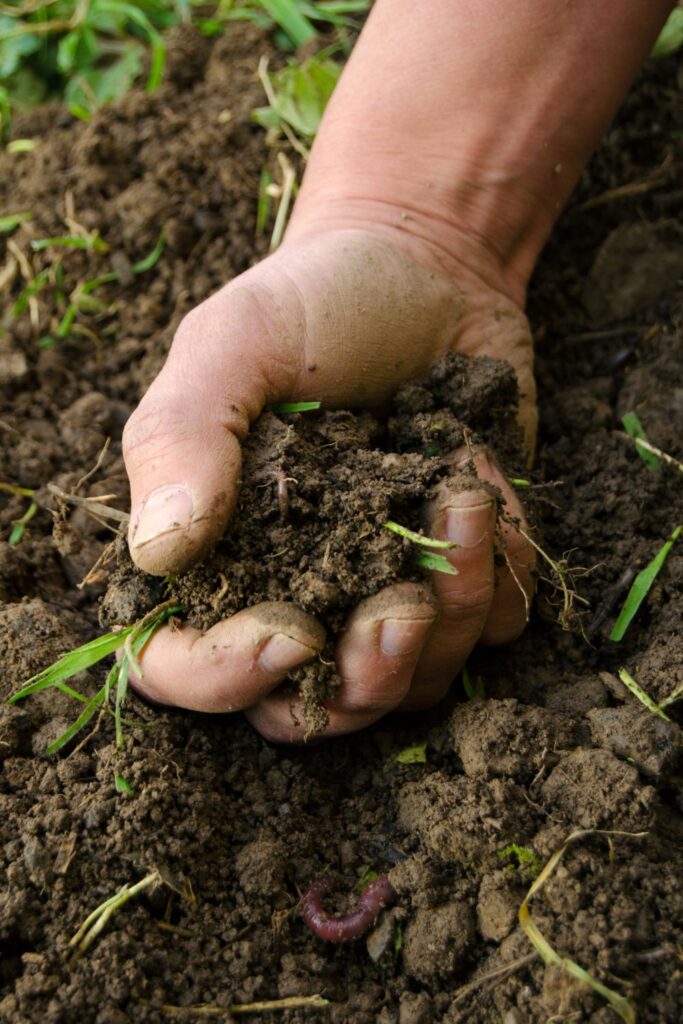
Make your own soil amendment
Rather than buying expensive soil amendments, consider making your own. Composting is a great way to create high-quality and nutrient-dense soil for your garden. You can also use kitchen scraps such as eggshells or banana peels as fertilizers in the garden.
Be creative when starting seeds
Rather than buying seed starting trays, get creative and use items you have around the house. Egg cartons, yogurt containers, and even toilet paper rolls can all be used to start seeds. (Read my post on upcycling yogurt containers if you have a ton of them.)
If you don't have a green thumb and have never started seeds before, let me just say that not everyone has good luck with this. In the long run, it will be cheaper to buy small plants rather than spend time trying to unsuccessfully start seeds in your house. There is a bit of trial and error to this process.
Buy compost in bulk
If you need a lot of compost, it will usually be cheaper to buy it in bulk. You can often find great deals on compost at nurseries or garden centers. Compost is incredibly good for your potential plants.
Plant them in early spring with a healthy side dressing of compost and you will give them a fighting chance of weathering all the pests and drought issues that seem to arise in mid-summer.
Use SNAP benefits for gardening
If you're on a tight budget, consider using your SNAP benefits to buy gardening supplies. Many stores and nurseries accept SNAP benefits for seeds, seedlings, and even soil amendments.
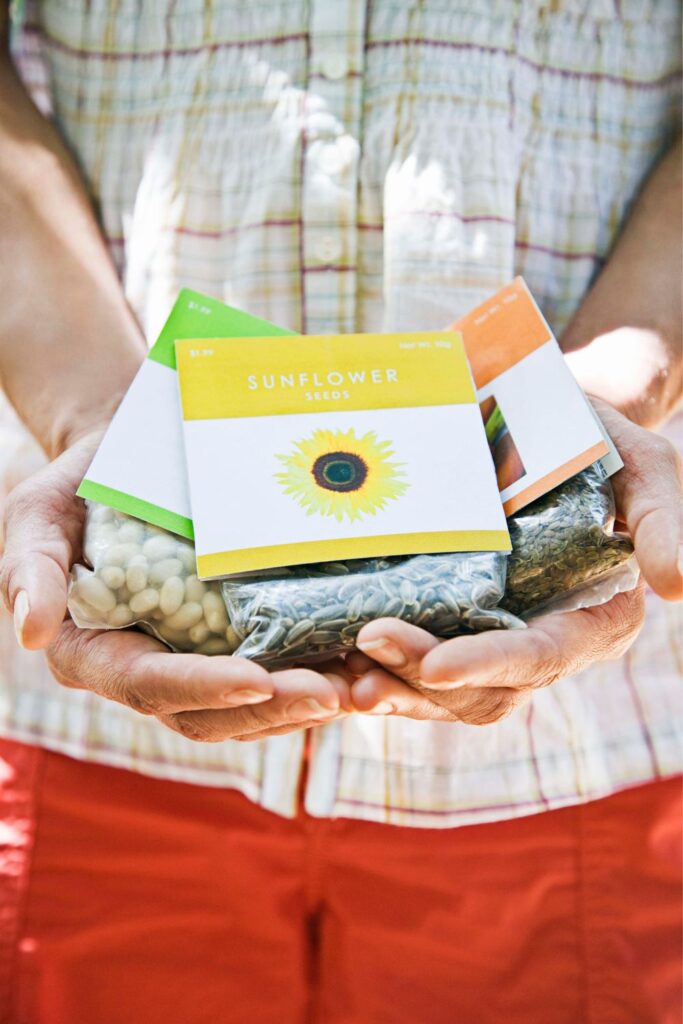
Find local plant or seed swaps
Local plant and seed swaps can be great places to find free seeds, cuttings, and more. Check out your local gardening groups or library for upcoming swap events. You can also look on your local buy-nothing group.
Find free mulch sources
Many cities and towns have sources of free mulch. Check with your local government to see if there are any programs in place that you can take advantage of. Many tree services will also deliver wood chips to your driveway. You may also be able to find mulch from friends or neighbors.
Mulch doesn't have to be fancy. You can use leaves, grass clippings, wood chips, and many other types of organic matter.
Make homemade potting soil
Rather than buying expensive potting soil, consider making your own. You can use a combination of compost, peat moss, and vermiculite to create your own nutrient-rich potting soil. It might be cheaper to mix them all individually than buy a premade mix.
Choose easy plants to grow
If you are a beginner, don't try to jump into growing the most difficult plants. Try some of the easier ones first and then expand your repertoire. Choose easy-to-grow vegetables such as tomatoes, peppers, green beans, cucumbers, and squash.
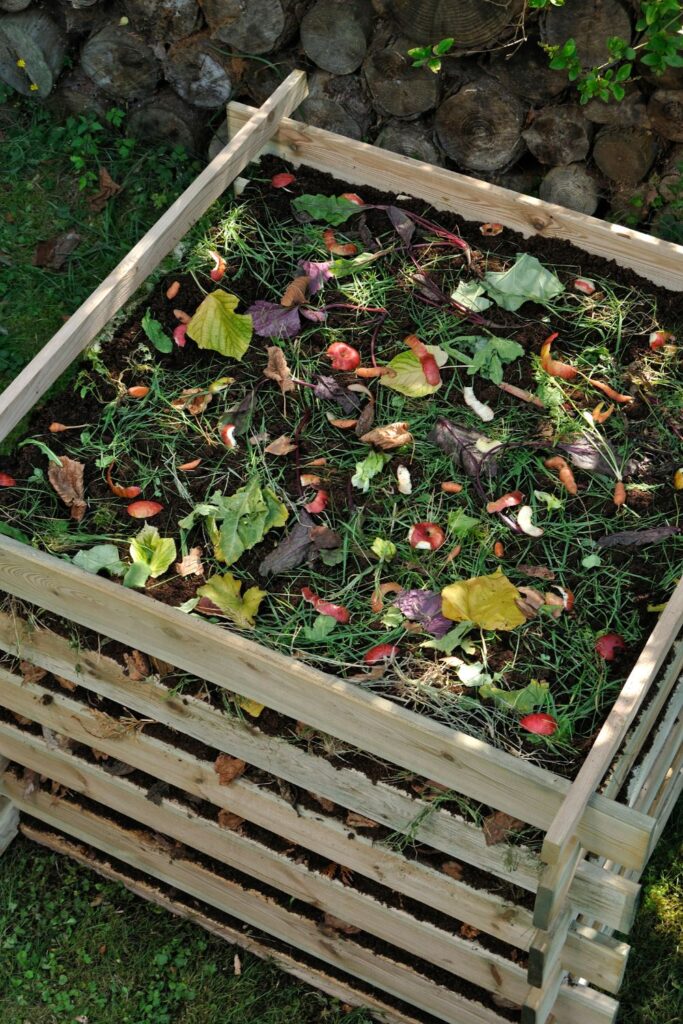
Make your own compost bin
Rather than buying a compost bin, make one from items you have around the house. Consider using an old plastic storage container or even a trash can with holes drilled in it for airflow.
All sorts of things can go in your composter including shredded leaves, scraps from your kitchen, and even some sorts of shredded office paper.
Try DIY pesticides and fertilizers
You can easily make your own pesticides and fertilizers from items you have around the house. Try using dish soap, garlic, or even banana peels as a natural pest deterrent. Bananas are cheap and tasty. Check out my post on creative uses for bananas and make sure to save the peels for your garden.
Buy used or free gardening tools
You can often find used gardening tools at garage sales or thrift stores. If you know someone who already gardens, they may be willing to give away old tools that they no longer need. Before you start looking, check out my garage sale tips for some advice.
Make use of rainwater
Rather than using the hose to water your garden, collect rainwater. You can easily make a rain barrel or two with repurposed materials so you have plenty of water for the growing season.
Before you do this, check to see if it is legal to collect rain water in your area. Yes, there are some places where it is NOT legal. There is no sense in saving money on your water bill only to get a pricy citation from the city.
Shop off-season for truly frugal gardening
Keep your eyes out for good deals. Many stores mark their gardening supplies half-price as soon as summer starts to wane. While it's not as easy to stock up on off-season plants, those containers and hoses are definitely great to find on sale.
Repurpose Items for the Garden
You can also repurpose items for use in the garden. Try using an old pallet as a vertical planter. You can also make your own trellises from PVC pipe or old wood pieces. More on that below!

How to Repurpose Items for the Garden
Here are a few things you may find around your home or at garage sales that you can actually use in the garden this spring. I use a ton of these in my own garden and they are all great ways to save money.
Milk jugs
Wash the inside with soap and water and rinse thoroughly. Poke holes in the lid with a nail or other sharp tool. Fill the jug with water and screw on the top. You now have a 'sprinkle' top watering can.
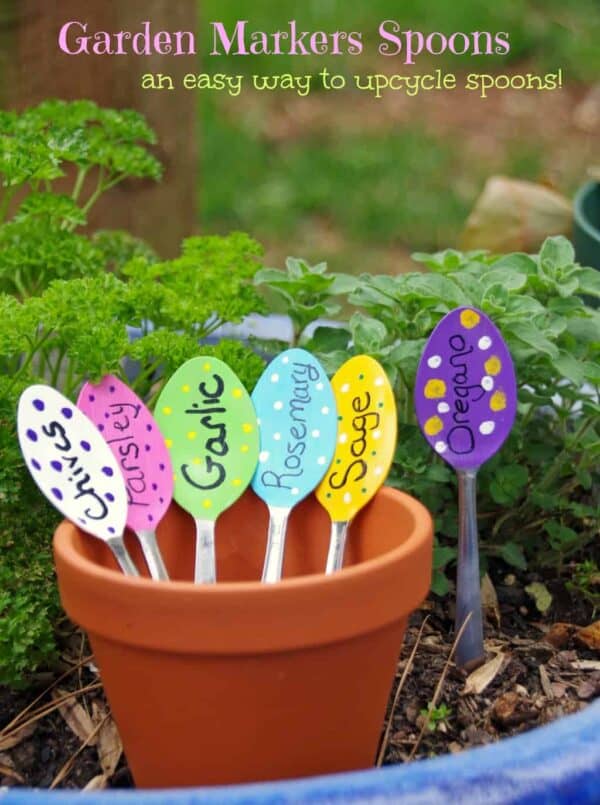
Extra metal spoons
This is one of my favorite frugal gardening tips. These are often found cheap at garage sales. Flatten with a hammer, paint the tops, and write the names of your garden plants on them.
This is a great idea for people who start from seed. You won't have to wonder what all those young plants are anymore before they start growing. Check out these garden marker spoons for inspiration.
Coffee grounds
Most gardeners are familiar with the benefits of coffee grounds in the garden. If you haven't heard of this from your gardening friends yet, go make a cup of joe and save the grounds!
Turn your used coffee grounds into the soil to add nutrients to your plants. It's a great way to add nitrogen and other elements that plants need. You can add it right into the hole in the ground as you plant your small plants or put it into a composter with other kitchen scraps.

Eggshells
Eggshells are incredibly versatile for people interested in frugal gardening. Not only are they wonderful seed starters but they help keep pests away.
To use eggshells as pest control, just rinse them out and let them dry. Crumble them around the base of plants to prevent slugs from eating your garden. No need to buy those expensive and questionably safe slug repellants at garden stores when eggshells work just as well.
2 Liter Soda Bottles
Save money on fancy frost-proofing and use soda bottles instead. Remove the labels from them and rinse. Cut off the bottom 4 inches with a razor blade. Place them over fragile seedlings to protect them from a light frost.
Egg cartons
Fill the holes of an egg carton with dirt and add seeds. Water as needed. When your seeds are ready to plant in the garden, just cut the cups of the egg carton apart and plant the entire thing!
Make sure you only do this with cardboard egg cartons. The Styrofoam ones will not degrade in the soil and should not be used for seed starting.

Tin cans
Tin cans make a great way to grow herbs or flowers vertically. Poke holes in the bottom of the cans with a hammer and nail. Paint them to the desired color.
Then, nail them to a wooden fence in a loose, scattered pattern. Fill with soil and small herb plants. You now have a vertical herb garden!
Not only is it a great way to garden in small spaces, but growing herbs off the ground keeps them away from small animals that might want to eat them!
I wouldn't recommend this for vegetables. Most veggies are too big to grow in a small can. However, fresh herbs are fun to grow in the home garden and make mealtime very flavorful. You can also grow a few edible flowers in them. If you have more tin cans than you need, make my DIY desk organizer with a few of them.
Old CDs or DVDs
Hang old CDs or DVDs from thread among your garden plants to scare off deer, rabbits, and other garden-eating critters.
For a large garden that cannot be fenced in, shiny things swinging in the breeze are a surefire way to keep animals out of the garden.
Glass Pie Dish
Fill an old pie dish with small glass stones and place it in your garden near some brightly colored flowers. Add enough water to almost cover the stones but not quite.
This is a wonderful way to attract pollinators to your garden since they need shallow puddles to drink from. Don't rely only on rainwater to fill the bowl. Keep an eye on it and top it off when needed with the hose.

Used tires
Whether they are tires from your car or ones you find cheap at a local tire center, used tires are incredibly beneficial in backyard gardens.
While you probably don’t want to plant food crops in them, stack a few on top of each other and plant colorful flowers in the center. Not only will it look beautiful, but the flowers will also attract beneficial insects to help pollinate your food garden.
Used mailbox
Have an extra mailbox laying around? Mount a mailbox post in the garden and add a mailbox to your backyard. It’s a great place to store frequently used tools and gardening gloves. No more running back to the garage when you forget your herb trimmers!
Old bowling balls
Have you recently quit your bowling team? Or upgrade to a new ball? That old bowling ball would make great garden art. Just paint and decorate to add a bright splash of color to your backyard.
Broken clay pots
This is another one of my favorite frugal gardening tips. Because I have a ton of broken clay pots! If you have any broken terra cotta flowerpots laying around, they make great toad houses. Turn it upside down so that there is a ‘door’ into the flowerpot for your toad friend.
You can paint or decorate it before leaving it in your garden, although the toads could care less about your lack of artistic skills. They just want a secure place to hide!
Old windows
Make your own mini greenhouse with old windows. This is a great way to extend the growing season and protect early and late-growing plants from frost. Ask your local neighborhood group to see if anyone has some to get rid of.
There are dozens of ways to upcycle and recycle old items into useful garden materials. Whether it is food scraps for the compost bin or garden stepping stones made from broken ceramic tiles, consider finding new ways to use old things to make your garden really stand out this spring. Read my post on easy gardening tips if you want more advice on growing a backyard garden.
If you are working on a budget, read my post on using a bullet journal to save money. And if you want more money-saving ways to upgrade your home, check out my article on budget-friendly outdoor decorating ideas. Let me know if you have any more frugal gardening ideas to share!

Diane is a professional blogger and nationally certified pharmacy technician at Good Pill Pharmacy. She has two college aged kids, one husband and more pets than she will admit to. She earned her BS in Microbiology at the University of New Hampshire but left her career in science to become a stay at home mom. Years of playing with LEGO and coloring with crayons had her craving a more grown up purpose to her life and she began blogging and freelance writing full time. You can learn more about her HERE.


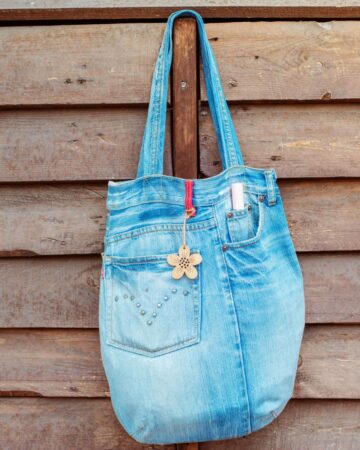
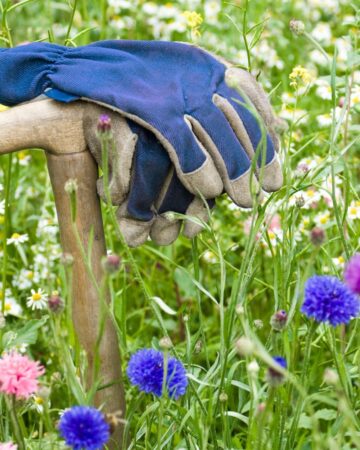
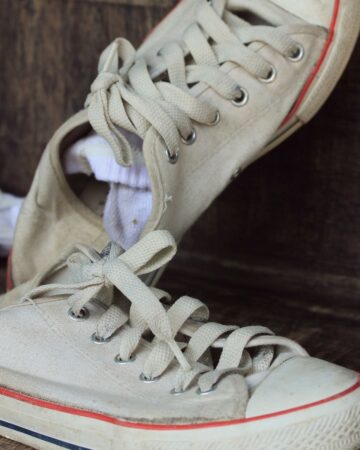
Leave a Reply